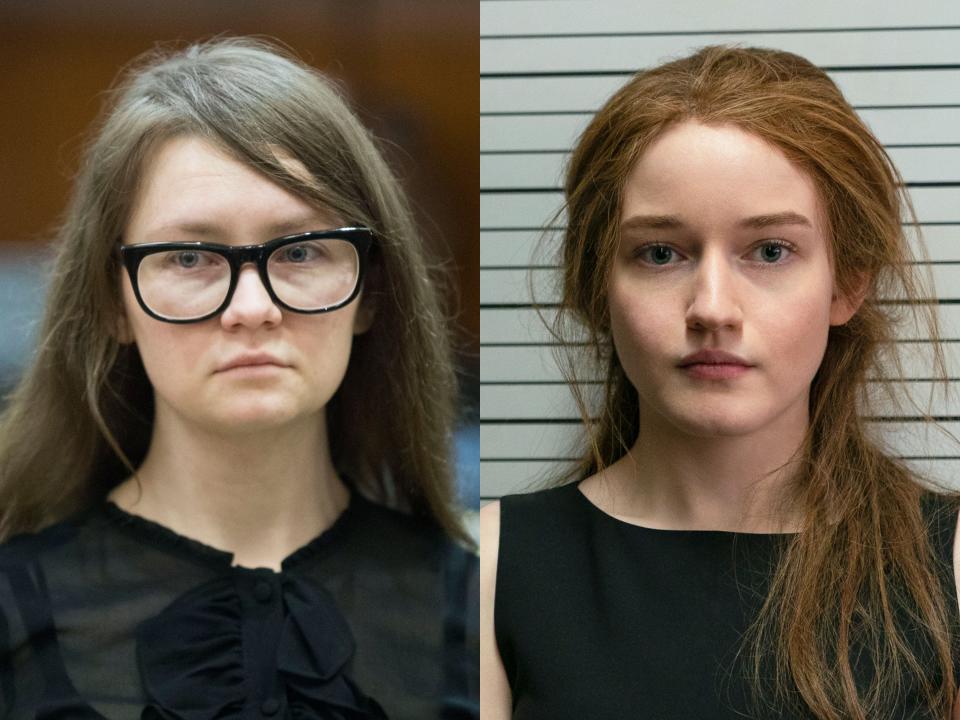
Anna Sorokin — aka Anna Delvey — was convicted in 2019 for a scam in which she pretended to be an heiress with a $60 million fortune. Her story is the subject of the Shonda Rhimes-produced Netflix limited series “Inventing Anna.”
Anna Sorokin — aka Anna Delvey — is sitting in a jail cell in upstate New York. After a period between 2013 and 2017 when she scammed New York’s downtown socialite scene as a fake German heiress, a jury found her guilty of grand larceny, among other charges, in connection with her scheme. Sorokin said she had a legitimate business plan for a project called the Anna Delvey Foundation. Her lawyer said she was trying to fake it ’til she made it.
On February 11, Netflix will release “Inventing Anna,” a nine-episode limited series based on Sorokin’s exploits and the journalist Jessica Pressler’s New York magazine article that made her famous. Julia Garner, who plays Sorokin, has said she and producer Shonda Rhimes visited Sorokin in prison while preparing the show.
The show traces how Sorokin grafted herself onto Manhattan’s business and art worlds by claiming she had a $60 million trust fund in Europe, scammed her way through expensive trips, hotels, and restaurants, while leaving everyone else with the bills, and the elaborate lengths she went to keep her operation going.
Police arrested Sorokin in 2017, and she spent about two years in jail on Rikers Island before her jury conviction. She served about another two years at Albion Correctional Facility in upstate New York until her release in February 2021. Sorokin was rearrested by ICE six weeks later for overstaying her visa and has remained in its custody since as she waits to see if she’ll be deported to Germany.
Below, Sorokin writes about her experience in prison, getting COVID-19 in jail, and having a Netflix show about her made while she sits behind bars.
While the world is pondering Julia Garner’s take on my accent in “Inventing Anna,” a Netflix show about me, the real me sits in a cell in Orange County’s jail in upstate New York, in quarantine isolation.
I am here because Immigration and Customs Enforcement decided that my early merit release from prison means nothing to them and, despite being perfectly self-sufficient when left to my own (legal) devices, I, in fact, present “a continuous danger to the community.” Apparently, Daily Mail headlines are admissible evidence that override the decisions of the New York State Board of Parole and can be used to back up the Department of Homeland Security’s arguments that instead of getting a job, I was “busy getting my hair done” — me and my bad ways.
While I was in prison, I paid off the restitution from my criminal case in full to the banks I took money from. I also accomplished more in the six weeks they deemed were long enough for me to remain free than some people have in the past two years. My visa overstay was unintentional and largely out of my control. I served my prison sentence, but I’m appealing my criminal conviction to clear my name. I did not break a single one of New York state’s or ICE’s parole rules. Despite all that, I’ve yet to be given a clear and fair path to compliance.
Did I mention I’m the only woman in ICE custody in this whole jail? Tell me I’m special without telling me I’m special.
“The court finds that, even if released from detention and ordered to report regularly to ICE, the respondent would have the ability and inclination to continue to commit fraudulent and dishonest acts,” an immigration judge ruled. “She clearly possesses the knowledge to do so and has failed to demonstrate remorse.” Sorry, am I on trial for this again?
So no — it doesn’t look like I’ll be watching “Inventing Anna” anytime soon. Even if I were to pull some strings and make it happen, nothing about seeing a fictionalized version of myself in this criminal-insane-asylum setting sounds appealing to me.


I still remember the night of ABC’s “20/20” episode about me in October. It was also unfortunately the night when the meds come really late, so everyone was up waiting and watched it.
It’s hard to explain what I hate about it. I just don’t want to be trapped with these people dissecting my character, even though no one ever says anything bad. If anything, everyone’s really encouraging, but in this cheap way and for all the wrong reasons. Like, they love all the clothes and boats and cash tips. I saw only the first couple minutes before I went back into my cell. I was definitely not going to sit there and watch it with everybody. And I don’t need any more jail friends, thank you very much.
For a long while, I was hoping that by the time “Inventing Anna” came out, I would’ve moved on with my life. I imagined for the show to be a conclusion of sorts summing up and closing of a long chapter that had come to an end.
Nearly four years in the making and hours of phone conversations and visits later, the show is based on my story and told from a journalist’s perspective. And while I’m curious to see how they interpreted all the research and materials provided, I can’t help but feel like an afterthought, the somber irony of being confined to a cell at yet another horrid correctional facility lost between the lines, the history repeating itself.
Admittedly, I, the ultimate unreliable narrator, have made some questionable choices that I wouldn’t necessarily repeat today.
Do these decisions inevitably make me a permanent threat to public safety? The government says yes.
But in comparison with whom? Everything’s relative.
It makes no sense for me to still be here long after they have brought in and then released numerous violent offenders (robbers, rapists, would-be murderers) and people with an assortment of felony DUIs and grand larcenies. Do they not “clearly possess the knowledge” to recommit the same crimes they’ve been accused of before, or do different standards apply to them?
Meanwhile, I spent another set of holidays followed by a COVID-19-tainted birthday in a depressing cell, which therefore logically categorized me as more dangerous than every single one of those people. In that case, it’s totally understandable why I shouldn’t be allowed out of my cell for weeks at a time. Who’d want to take the risk?
After I finished my prison sentence and left Albion, I thought all this was over, forever, and that I’d never see the inside of another correctional institution again.
Shortly afterward, I found myself in the Orange County jail by way of Bergen County Jail, where everything triggers constant flashbacks. Altogether, I’ve been through seven different facilities for one single case. It’s like “Groundhog Day.”
I never complained about a lot of things. From the very beginning of my journey incarcerated in the state of New York, I thought people just wanted to see me be miserable.
The same hand consistently finds its way to your knee, lingers on your calves, grabs your ankles, wrists, waist: cuffs, chains, bruises on the same spots. It’s all for the sake of security, of course.
Be cool. Don’t be annoying. I was considered “not a regular white girl, like the rest of them here.” I tried to be a “good sport,” and it got me things. Not always but most of the time. Small stuff — enough to be competitive about. I got away with things others didn’t. It’s not that I wanted their validation. It was more that I didn’t want to deal with the consequences of not having it.
I didn’t say anything when they brought article printouts and tearouts from papers and magazines, in a jail where the New York Daily News is being policed daily and purged of any mentions of Rikers and any of its inmates in “media review.”
A lot of this nonabuse is subtle, shaped by an understanding that in jail, you are a problem that needs to be dealt with.
What you won’t see in the Netflix show is my newly acquired habit. I have to methodically bite the skin around my nails until the nail beds slowly fill with blood from both sides, collect at the tip, which I then squeeze until there’s enough to drip down the sink of the cell with opaque white-spray-painted windows I spend 91.2% of my day in. Rinse and repeat. It doesn’t accomplish anything tangible, other than dulling an obsessive fixation on another wasted day that I’ll never get back. And I can’t just stop.
In jail, I quickly gave up on the concept of privacy. How many people can really say they are fully in control of theirs, anyway?
And most importantly — didn’t I put myself here?
Just when I thought it couldn’t get any worse, on January 19, I tested positive for COVID-19.
I’m sure I’ll live, but I haven’t been this sick in years.
The jail’s response to a positive test is to just lock you up. It’s convenient for them. It all shall pass, no? The majority of people here quickly caught on and stopped complaining about symptoms out of fear of getting locked in. The staff insists on using the words “medical isolation,” even though there’s nothing medical about it. One is simply being made to sit in a cell with a hole in the door. This place is like a Petri dish for viruses and bacteria. The only fun is listening to dim-witted sergeants come up with 50 different ways to tell you no.
There is always a good reason for everything. They’re understaffed and tired, and there is a hundred-day backlog (Of what? No one ever specifies.), which apparently is supposed to be my problem, even though I never asked to be here. I don’t recall any delays or backlogs in me getting arrested.
I haven’t seen a real doctor in over four years. Dismissive nurses who suspect everyone just wants to get high and would do anything to obtain generic meds don’t count.
It’s designed this way, the jail. They take away your choices, and give you the worst, so next time you’ll think twice before stabbing your neighbor — or overstaying your visa.
During my latest ICE bond hearing, in October, it was the government’s burden to prove I would be a danger to my community if I were released.
They presented no evidence to demonstrate my alleged insatiable drive for continued criminal exposure. With eight remaining years of parole supervision apparently not being a good enough deterrent, and in absence of anything better, what they did find was an Instagram post from 2018 — an old picture of my friend Neff and me on a rooftop in Manhattan’s Chelsea neighborhood, posted by her to my account with the location tagged as “Rikers Island maximum security prison” (which isn’t even a thing), as a throwback joke. (Editor’s Note: Neffatari Davis is Anna’s friend and a consultant on “Inventing Anna,” and was extensively quoted in the New York magazine story.)
The picture started multiple internal and NYPD investigations, none of which yielded results. I never got as much as a written infraction.
It was refreshing to find out that for an agency that thrives on flaunting all kinds of rules, ICE created very few restrictions for its own operations.
It’s hard to prepare or submit any evidence for the court’s consideration when you find out about the hearing 10 minutes before it takes place. Is it fair to call me “unpredictable” if you never gave me a chance to create stability?
The most recent twist from ICE is that I’ve been waiting since November for a decision “to reissue” a letter that never arrived here. It should be an easy thing to determine considering all my mail is being logged. Who knows how much longer it will take to think this over — a month, six months, a year?
Such decisions can’t be rushed. And as long as the threat to public safety is secured in a cell, who cares?
Many of the inmates here don’t speak a word of English but are released into the community without as much as an ankle bracelet or token bail. I’m genuinely glad for them. The majority I’ve encountered seem like kind and well-meaning people who happen to have made a couple of mistakes. But I doubt any of them meet the standards of financial stability and property ownership ICE has used to keep me in here.
Most Americans think of Mexico when they hear “ICE.” No wonder — the mainstream media is flooded with news where Immigration and Customs Enforcement is mentioned mainly in the context of deportations and detentions of minorities.
During my time in this jail (where I’m in general population with others who are in regular criminal proceedings), I’ve learned that most people don’t even realize ICE deals with every immigrant, not just enforcement of the southern border. I’ve heard numerous variations of, “I didn’t realize you were Mexican. You really can’t tell!” and, “It’s crazy that they can hold you for this long, and you aren’t even from Mexico.”
The revelation that you didn’t have to be Hispanic to have all kinds of problems with ICE seemed to register as genuine surprise.
Some go a step further and offer friendly advice: “Did you know there’s an office in the city where you can renew your visa? Did you ask your lawyer?” Yes, and then I kind of got arrested at that office.
Will I forever be judged by my early-to-mid 20s?
Is there anything else I could possibly have done to close this chapter?
Will I forever be stuck in a past not entirely of my creation without getting a chance to move on?
How many years of reflecting on an overdrawn bank account are socially acceptable before one is allowed to open another one?
How many ancient VHS tapes does one have to watch before one’s considered reformed?
Read the original article on Insider




